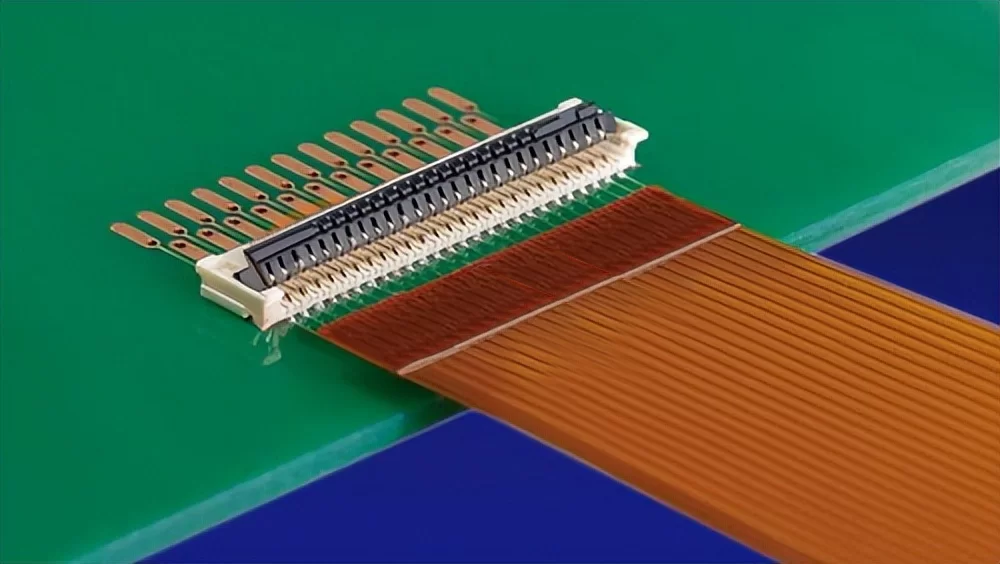The flex circuit connector, also known as flexible printed circuit (FPC), flex PCB, or flex cable, is an electronic connector with bendable properties. It consists of a flexible substrate and conductive traces, commonly used to connect electronic components or circuit boards with different shapes that require flexibility and reliable connections.
Flex circuit connector are typically composed of a flexible substrate and conductive traces. The flexible substrate can be made of heat-resistant materials such as polyimide (PI) or polyester (PET), providing characteristics like high cable density, lightweight, and flexibility. The conductive traces are made of conductive materials like copper foil, formed into conductive patterns through processes like electroplating.
Moreover, FPC connectors are structured with four main components: the core, the tongue, the terminal, and the solder tab.
The core serves to protect the terminals, provide insulation, ensure proper alignment during connection, and offer mechanical strength. It is commonly manufactured using injection molding processes with materials like PA9T.
The tongue is responsible for pressing the conductor, insulation, aligning during connection, and providing mechanical strength. It is typically produced using injection molding processes with materials like PA10T or PPS.
The terminal facilitates the conduction of electronic signals. It is manufactured using stamping and plating processes (gold or tin plating) and uses materials like phosphor bronze C5191.
The solder tab aids in component positioning, fixation, and reinforcement. It is also produced using stamping and plating processes (gold or tin plating) and employs materials like brass C2680.
The functions of flex circuit connector include:
Signal Transmission: FPCs are widely used for signal transmission, connecting signal lines between circuit boards to ensure reliable signal transmission and maintain high-quality performance.
Power Conduction: FPCs can also conduct electricity, connecting power lines between circuit boards to transmit current and power devices reliably.
Flexible Connection: FPCs' flexibility allows them to bend, fold, and twist without damaging the conductors, making them suitable for applications requiring flexible connections or constrained spaces.
Space Saving: Compared to traditional rigid connectors, FPCs can be installed in limited spaces, thanks to their thin design and flexible substrates, aiding in miniaturization and lightweight design.
Vibration and Stress Resistance: FPCs can withstand physical vibrations and stresses, reducing the risk of connection failures and breakage.
Reliability and Durability: With high-quality materials and manufacturing processes, FPCs offer excellent reliability and durability, maintaining stable performance over extended periods and multiple flexing cycles.

Flex circuit connector
Flex circuit connector have several advantages:
High Density: FPC connectors have a small volume and compact structure, allowing for high-density installation in limited spaces, suitable for various miniaturized and highly integrated electronic devices.
High Reliability: FPC connectors provide stable and reliable connections between terminals and sockets, ensuring the quality and stability of signal transmission.
Bendability: Due to their flexible nature, FPCs can bend and fold freely, suitable for various complex applications, especially in consumer electronics.
Low Cost: FPC connectors have low manufacturing costs and can be mass-produced, resulting in relatively low prices, beneficial for reducing the overall cost of electronic devices.
Simple Maintenance: If circuit modifications or repairs are needed, only the corresponding FPC connector needs to be replaced, simplifying maintenance.
Strong Universality: FPC connectors have a high degree of standardization, allowing different manufacturers' connectors to be interchangeable, enhancing versatility.
Strong Customizability: FPC connectors can be designed and manufactured according to customer requirements, meeting various specifications and performance requirements.
FPC are widely used in various applications:
Communication Devices: Including mobile phones, telephones, fax machines, switches, etc., FPCs are primarily used for signal transmission and connection in these devices.
Computers and Peripherals: Such as computer hosts, monitors, keyboards, mice, printers, etc., FPCs connect various components in these products, facilitating signal transmission and data exchange.
Industrial Controls: In industrial control applications, FPCs are extensively used in various control devices and sensors, such as PLCs, DCSs, servo motors, encoders, etc.
Automotive Electronics: In the automotive electronics field, FPCs mainly connect various electronic control units, sensors, and actuators, realizing various control functions in automobiles.
Medical Devices: In the medical equipment field, FPCs are used to connect various medical instruments and sensors, such as monitors, ventilators, hemodialysis machines, etc.
Home Appliances and Consumer Electronics: Such as televisions, washing machines, air conditioners, stereos, etc., FPCs connect various components and transmit signals in these products.
Camera Modules: In camera modules, FPCs serve as wires connecting various components, providing a degree of circuit protection.
In summary, flex circuit connectorhave become an indispensable part of modern electronic devices, widely applied in various fields.